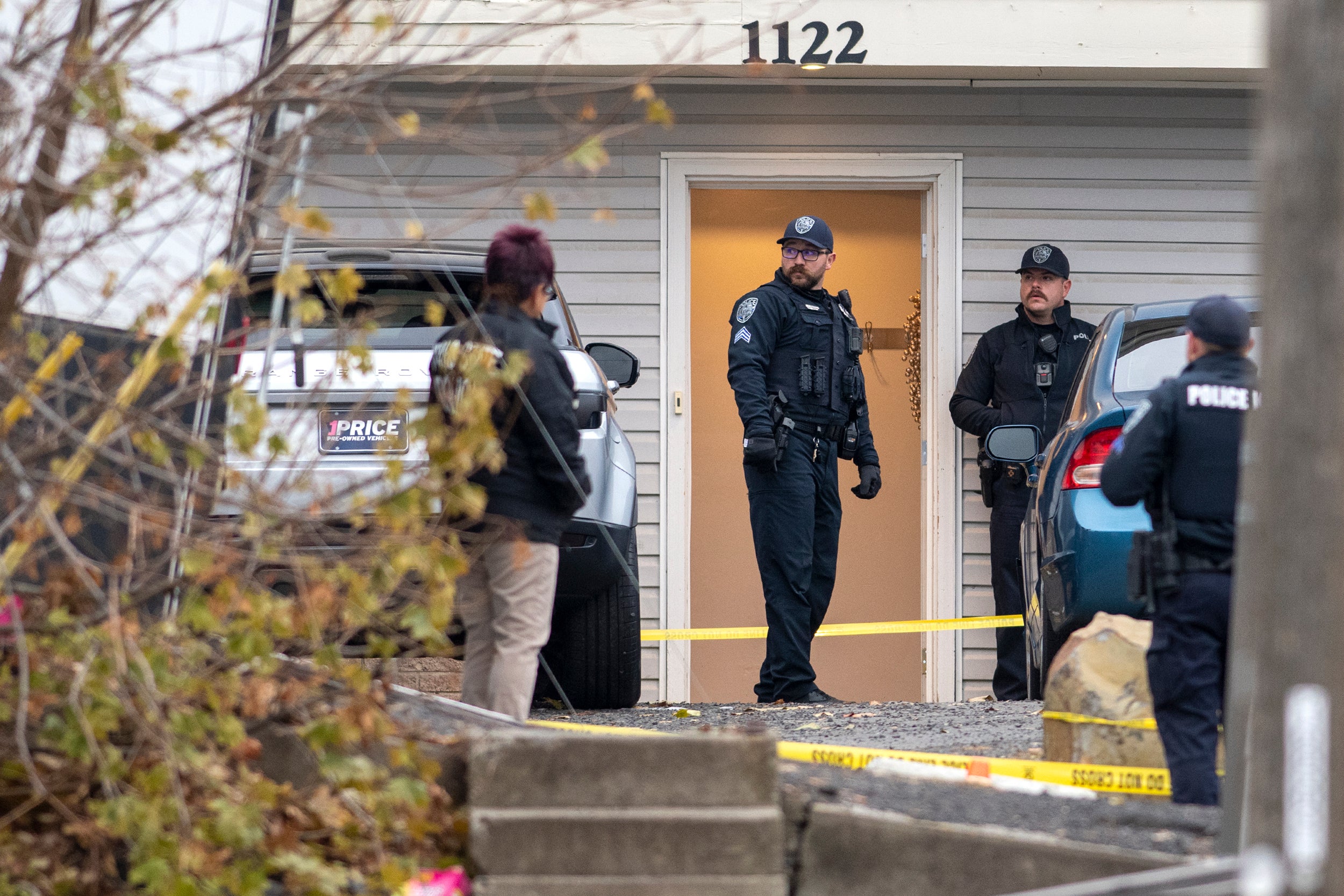Bryan Kohberger’s father called police on accused Idaho killer nine years before murders
When confronted by his father over the theft, Bryan Kohberger chillingly warned him ‘not to do anything stupid’, according to court records
Bryan Kohberger’s father called the police on his son nine years before his son allegedly murdered four University of Idaho students in a shocking knife attack that has horrified America.
Court records, newly obtained by ABC News, reveal that Mr Kohberger was arrested and charged with stealing one of his sister Melissa’s cellphones back in 2014.
The then-19-year-old had recently left rehab for drug addiction issues and had returned to the family home in Pennsylvania.
Then, on 8 February 2014, he stole the $400 iPhone and paid a friend $20 to pick him up and take him to a local mall where he then sold it for $200.
When confronted by his father Michael over the theft, Mr Kohberger chillingly warned him “not to do anything stupid”, according to the court records. His father reported the incident to the police.
The 19-year-old was arrested and charged with misdemeanor theft.
He didn’t serve any jail time and his record now appears to be expunged under Monroe County’s program to clear the records of first-time offenders.
A source told ABC News that prosecutors in Idaho are now looking into the 2014 case ahead of Mr Kohberger’s trial for the murders of Kaylee Goncalves, Madison Mogen, Ethan Chapin and Xana Kernodle.
Prosecutors announced on Monday that they are seeking the death penalty against the 28-year-old criminal justice graduate.
In a notice of intent, Latah County Prosecutor Bill Thompson cited five “aggravating circumstances” that could warrant the maximum sentence of capital punishment being sought including that the murder was “especially heinous, atrocious or cruel, manifesting exceptional depravity” and that the defendant showed “utter disregard for human life”.
“The State gives this notice based on the fact that it has not identified or been provided with any mitigating circumstances sufficient to prohibit the triers of fact from considering all penalties authorized by the Idaho legislature including the possibility of a capital sentence,” prosecutors wrote in the filing.

“Consequently, considering all evidence currently known to the State, the State is compelled to file this notice of intent to seek the death penalty.”
Under Idaho law, prosecutors have 60 days from the day the defendant enters a plea to notify them of their intent to seek the death penalty.
Mr Kohberger refused to enter a plea at his arraignment on four charges of first-degree murder and one charge of burglary last month. His attorney said that he was “standing silent” on the charges, leaving the judge to enter not guilty pleas on his behalf.
The death penalty notice was filed one day before the accused killer’s latest court appearance on Tuesday.
In a hearing in Latah County Court, Judge John Judge revised a gag order to clarify that it does include members of law enforcement, investigators and expert witnesses for both sides. He also warned the media not to focus cameras solely on Mr Kohberger in the courtroom – or they run the risk of cameras being banned altogether.
The judge had been expected to hear arguments on several motions filed by the defence in recent weeks, including asking the court to order prosecutors to turn over more DNA evidence and details about the grand jury which returned an indictment against him.
Some of those issues on motion to compel and discovery had been resolved out of court while some will be argued at a later date.
The defence did ask the judge to order the prosecution to hand over some evidence in case – including police training records and Mr Kohberger’s cellphone records.
Insisting it is not a “fishing expedition”, Mr Kohberger’s attorneys said they need the evidence to be able to give him a strong defence.
In one of the multiple court filings submitted by his attorneys last week, Mr Kohberger insisted he has “no connection” to the four slain students and claimed that DNA from three other unidentified men was also found at the grisly crime scene.
Court documents, filed by attorneys for the 28-year-old PhD student last week, argue that DNA from two other men was also found inside the off-campus student home in Moscow, Idaho.
DNA from a third unknown man was also found on a glove found outside the property on 20 November – one week on from the murders, the documents state.
“By December 17, 2022, lab analysts were aware of two additional males’ DNA within the house where the deceased were located and another unknown male DNA on a glove found outside the residence on November 20, 2022,” Mr Kohberger’s attorney Jay Logsdon writes in the filing.
“To this date, the Defense is unaware of what sort of testing, if any, was conducted on these samples other than the STR DNA profiles.
“Further, these three separate and distinct male DNA profiles were not identified through CODIS leading to the conclusion that the profiles do not belong to Mr. Kohberger.”

Mr Kohberger’s defence is fighting against the state’s use of genetic genealogy to tie him to the brutal murders.
According to prosecutors, the killer left a military knife sheath behind at the scene of the 13 November stabbings. The sheath was found next to Mogen’s body in her bed on the third floor of the student home.
DNA found on the sheath was later matched to Mr Kohberger after the FBI checked the sample against genetic genealogy databases and “tipped off” local authorities.
After collecting trash from the suspect’s parents’ home in the Poconos Mountains, a familial match – from Mr Kohberger’s father – was made to the knife sheath, according to the criminal affidavit.
Following Mr Kohberger’s arrest on 30 December, DNA samples were taken directly from the suspect and came back as “a statistical match”, say prosecutors.
In the latest court filing, the accused killer’s legal team accused prosecutors of “hiding its entire case” from the defendant by trying to keep its method of “genetic genealogy investigation” secret.
“There is no connection between Mr. Kohberger and the victims,” states the filing titled Objection to State’s Motion for Protective Order.
“There is no explanation for the total lack of DNA evidence from the victims in Mr Kohberger’s apartment, office, home, or vehicle.”
The filing came in response to the state’s motion for a protective order around the methods it used to match his DNA to the crime scene.

The defence is arguing that the prosecution should hand over all this information to Mr Kohberger and that he has a right to know what led investigators to suspect him in the first place.
“Perhaps unsurprisingly, Mr. Kohberger does not accept that his defense does not need this information,” his attorneys argue.
They claim that authorities don’t want the suspect to see “how many other people the FBI chose to ignore during their investigation” and also don’t want the public to be deterred from sharing their genetics with such websites “if they were to realize the government is watching”.
A separate motion to compel discovery revealed that Mr Kohberger’s defence is demanding the state hand over the DNA profiles of the three other males whose DNA was found at the scene.
Mr Kohberger is scheduled to stand trial on 2 October for the murders of Goncalves, 21, Mogen, 21, Kernodle, 20, and Chapin, 20, after he was indicted by a grand jury on four counts of first-degree murder and one burglary charge.
Mr Kohberger is accused of breaking into an off-campus student home on King Road in the early hours of 13 November and stabbing the four students to death with a large, military-style knife.
Two other female roommates lived with the three women at the property and were home at the time of the massacre but survived.

One of the survivors – Dylan Mortensen – came face to face with the masked killer, dressed in head-to-toe black and with bushy eyebrows, as he left the home in the aftermath of the murders, according to the criminal affidavit.
For more than six weeks, the college town of Moscow was plunged into fear as the accused killer remained at large with no arrests made and no suspects named.
Then, on 30 December, law enforcement suddenly swooped on Mr Kohberger’s family home in Albrightsville, Pennsylvania and arrested him for the quadruple murders.
The motive remains unknown and it is still unclear what connection the WSU PhD student had to the University of Idaho students – if any – prior to the murders. The murder weapon – a fixed-blade knife – has still never been found.
As a criminal justice PhD student at WSU, Mr Kohberger lived just 15 minutes from the victims over the Idaho-Washington border in Pullman.
He had moved there from Pennsylvania and began his studies there that summer, having just completed his first semester before his arrest.
Before this, he studied criminology at DeSales University – first as an undergraduate and then finishing his graduate studies in June 2022.
While there, he studied under renowned forensic psychologist Katherine Ramsland who interviewed the BTK serial killer and co-wrote the book Confession of a Serial Killer: The Untold Story of Dennis Rader, the BTK Killer with him.
He also carried out a research project “to understand how emotions and psychological traits influence decision-making when committing a crime”.
He is facing life in prison or the death penalty for the murders that have rocked the small college town of Moscow and hit headlines around the globe.



Bookmark popover
Removed from bookmarks